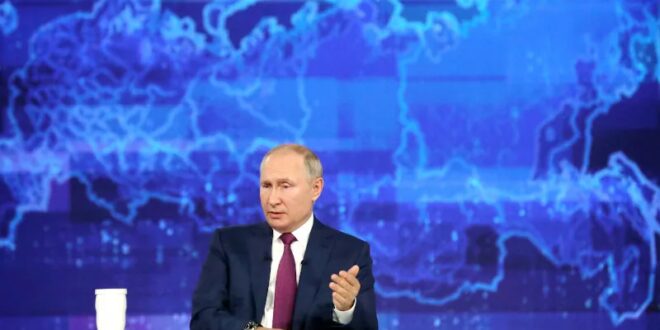As Russia continues to wage its war in Ukraine, several Western leaders have openly hinted at their wish to see Russian president Vladimir Putin go. US president Joe Biden declared on 26 March that Putin “cannot remain in power”, while UK Prime Minister Boris Johnson’s spokesperson said on 1 March that the sanctions on Russia “are to bring down the Putin regime.” Yet while their ambition to see the end of Putin’s regime is understandable, there is no guarantee that what comes after will be any better.
To see why, it’s necessary to understand why Putin is so popular in Russia (according to Levada Centre, an independent Russian polling agency, around 83 percent of the population approve of Putin). In the West, Putin is portrayed as a dictator. Yet in Russia he is viewed among many as a leader who restored order, offered stability, and ensured steady economic growth, boosted by a surge in global oil prices between 1998 and 2008. Just as importantly, Putin returned a sense of national pride after the humiliation of losing the Cold War and the chaotic 1990s, when Russia was on its knees and unable to influence global affairs. Russia could only stand and watch as NATO bombed Russia’s ally Yugoslavia in 1999. Then came Putin. Russians watched with admiration how he prevented the overthrow of Russia’s ally Bashar al-Assad in Syria and how he seamlessly annexed Crimea. For many Russians, Putin has enabled them to bask in the glory of living in a strong and influential Russia again. This serves as a blueprint for what Russians would look for in a future leader.
Some may argue that Russia simply hasn’t been given the chance to become a liberal democracy under the heavy weight of Kremlin’s authoritarianism. After all, other post-Soviet states turned towards the West when the opportunity was provided. Latest example is, of course, Ukraine, which decided in 2014 to go with the West, despite Russian efforts to pull it towards its sphere of influence. But Russia is different. Anti-Western sentiment is a key element of its psyche. According to a Levada Center poll conducted in February 2020 on how Russia should treat the West, only 11% said “as a friend”. That figure is almost certainly even lower now.
Most Russians have no longing to join the Western camp or embrace Western values. On the contrary, Russian state TV often mocks what they describe as Western moral decadence, ineptitude and flaws in democracy. There is little chance of Russians becoming more progressive in the near future. Orthodox Christianity is thriving after enduring a 70-year period of atheistic Soviet rule. In 1991, about two-thirds of Russians claimed no religious affiliation. Now, around 70 percent of Russians identify as Orthodox. This increased religiosity is propagating social conservatism, traditional family values, respect for hierarchy and authority – principles that the Kremlin wants to promote.
In the West we often mention the Western-friendly political opposition in Russia as bright hope for Russia’s future, with Alexei Navalny spearheading the opposition. We want to believe that if only Putin loosened his grip on power, the opposition would be able to thrive and succeed. This is most likely wishful thinking. According to a Levada Center survey in September 2020, only 20% of Russians view Alexei Navalny positively, while 50% view him negatively. Russia, of course, has a distinct opposition-minded public, particularly the younger urban generation who consume alternative media. But they are a minority in Russia. Besides, their opposition to Putin is primarily propelled by a yearning to combat corruption and economic inequality in Russia, rather than by a desire to see a Western-friendly president.
Russian state propaganda is not fully to blame for this. In 2020, just 62% of Russians watched state television every day, a drop from 92% compared to 2010. Over the last 11 years, the share of Russians who say they believe state television has fallen from 79 percent to 48 percent, while the percentage who say they trust online media has risen from 11 to 47 percent. Despite this, most Russians are happy to accept the narrative that is being offered to them by the state media, particularly on the war in Ukraine. It is likely that Russians agree with state and media propaganda not because they trust it, but because it’s what they like and want to hear.
Ultimately, there is no reason to believe that the Kremlin will be qualitatively different after Putin. The system that he created has endured for so long because most Russian citizens are broadly sympathetic to it. The craving for strong leadership, paternalism, and national pride goes back for decades. If Russia is still considered a pariah state by Western countries when Putin’s presidency eventually comes to an end, it would only be natural for Russians to embrace another authoritarian-type leader who will position himself as the protector of the motherland from the aggressive and morally corrupt West. Economic hardship also attracts people toward dominant, authoritarian leaders. If Russia’s economy is still facing headwinds due to Western sanctions, it will only add to the conditions for a new dictatorial leadership.
Deeply engrained feelings of patriotism, nationalism, social conservatism, resentment towards the West, as well as prolonged economic hardship and diplomatic isolation, means that Russia is unlikely to change course when it comes to the profile of its leadership. After over twenty years of dealing with Putin, it is understandable why many Western leaders are wishing for his regime’s demise. Yet this could be a case of ‘be careful what you wish for’, as what comes after Putin could be even worse.
 Eurasia Press & News
Eurasia Press & News



